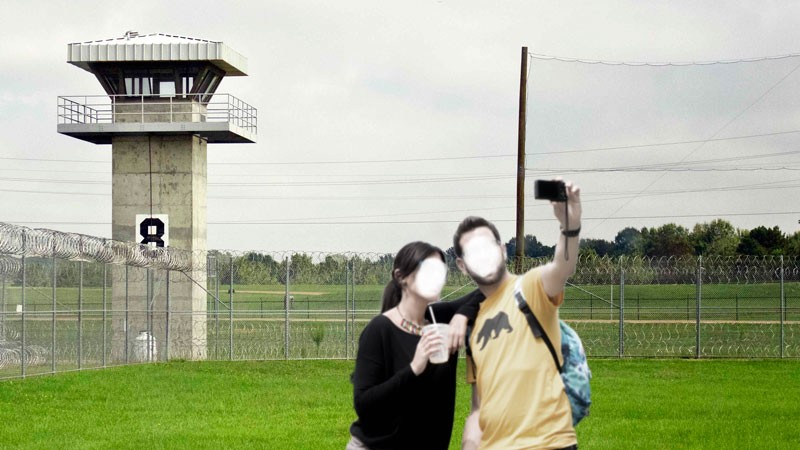
The consumer rights group OZPP says traveling to Crimea without Kyiv's permission could result in serious legal problems. Image edited by Kevin Rothrock
Last month, Russian federal censors blacklisted a travel advisory published online by a consumer protection group known as OZPP on charges of extremism. Officials targeted OZPP because it released a memo cautioning tourists against traveling to Crimea, which it warned is considered “occupied territory,” according to international law. OZPP advised potential tourists to seek permission from the Ukrainian government, before setting foot in Crimea.
Since June 22, 2015, neither OZPP's website or the single webpage with its travel advisory has been accessible to Russian Internet users.
“The Memo to Customers Traveling to Occupied Territories” [1] advises tourists to ask Ukrainian migration authorities for permission to enter Crimea by crossing the Russian-Ukrainian border at a checkpoint controlled by Kyiv. The memo also cautions tourists against buying real estate in Crimea. According to OZPP's analysts, anyone who violates Ukrainian sovereignty with unsanctioned travel or financial transactions could face prosecution by Kyiv or other foreign powers.
After OZPP's memo started making headlines in the Russian media, the Attorney General's Office came to a decision [2] that the travel advisory is extremist. Prosecutors are now determining whether or not to open a formal criminal investigation against the group. If police launch a case and press charges, a conviction could put OZPP's administrators behind bars for as long as five years.
Mocking the authorities’ concerns about OZPP, the satirical VKontakte community Lentach tweeted a cartoon mocking the logo of Roskomnadzor, the Kremlin's media watchdog agency:
Сайт Общества защиты прав потребителей,советовавшего россиянам не ездить в Крым,заблокировали http://t.co/IZb9mZiZ4U [3] pic.twitter.com/FVNtXpE2Te [4]
— Лентач (@oldLentach) June 23, 2015 [5]
The unique glasses: “Roskomnadzor’s eyesight.” They let you to see everything that is concealed! [Without eyeglasses, the meme seems harmless: Don’t go to Crimea. With eyeglasses, the extremism becomes apparent: Don’t go to Crimea! It should be returned to Ukraine and all those who disagree should be killed.]
In an interview with the news agency RBC [6], OZPP head Mikhail Anshakov said his group published the memo after receiving complaints from “several dozens” of Russian citizens who said they had trouble obtaining European travel visas, since visiting Crimea, after the Russian annexation in March 2014.
According to Rublacklist.net, a project by the Russian Pirate Party that keeps track of the country's blacklisted websites, government censors also blocked Anshakov’s personal blog on LiveJournal.
Anshakov is a well-known critic of both the Kremlin and Patriarch Kirill, the head of Russian Orthodox Church, whom Anshakov tried to defrock in 2012 for living extravagantly and operating numerous businesses inside the Moscow’s main church, the Cathedral of Christ the Savior.
Recently, Anshakov formally appealed to Russia's Constitutional Court, asking judges to rule on the constitutionality of Crimea's reintegration with Russia.
The NGO’s position on Crimea has spurred criticism from several high-profile politicians, who rushed to call the group a “foreign agent,” though OZPP isn't formally an organization and therefore does not meet Russia's description of a “foreign agent” NGO.
In his speech [7] to the Civic Chamber, an oversight committee that monitors government bodies, Putin blamed OZPP for serving interest of foreign countries:
Вот недавнее событие, уже не помню, как эта организация называется, которая якобы заботится о потребителях, начала давать рекомендации по поводу того, как вести себя нашим туристам в Крыму и как относиться к решению вопросов с собственностью в Крыму. Вот это как называется: это забота о гражданах России? Нет, это обслуживание интересов иностранных государств в отношении России. Именно для этого и вводилось это понятие «иностранный агент», чтобы иностранные государства не использовали инструментов подобного рода для вмешательства в наши внутриполитические дела.
Recently one organization, I don’t remember its name, which, so to speak cares about customers, began to make recommendations to our tourists about how to behave in Crimea and how to deal with real estate in Crimea. What do we call this? Caring for Russian citizens? No, this is serving foreign interests, and it's happening inside Russia. For this reason, the term “foreign agent” was introduced, to keep foreign states from applying such tools for meddling in our internal politics.
On his LiveJournal page [8], still accessible to Internet users outside Russia, Anshakov responded to Putin about OZPP's foreign agent status, accusing him and other officials of spreading ignorance and paranoia:
Позиция ОЗПП: 1. Господин Путин В.В. некомпетентен давать оценку деятельности общественных объединений; 2. Господин Путин В.В. плохо информирован, так как ОЗПП не имеет официального статуса иностранного агента и не получает зарубежного финансирования; 3. Подобного рода заявления самого господина Путина В.В. и ряда его коллег в связи с публикацией Памятки для потребителей при посещении оккупированных территорий временами похожи на симптомы паранойи.
This is OZPP’s position: 1. Mr. Putin is not qualified to assess the activity of public organizations; 2. Mr Putin is badly informed because OZPP does not have official status as a “foreign agent” and is not financed from abroad; 3. Such declarations from Mr. Putin himself, as well as a number of his colleagues, about to release of the “Memo to Customers Traveling to Occupied Territories” displays some signs of paranoia.
Ironically, while OZPP does not appear on the Justice Ministry's official registry [9] of “foreign agents,” OZPP did declare itself a foreign agent in 2012, when the law [10] was enacted, in solidarity with other civic organizations, in protest against the legislation.
Some officials, like Duma deputy Alexander Sidyakin, hope [11] police will still find a way to add OZPP to Russia's blacklist, accusing the group of “already performing so diligently the duties of a foreign agent.”